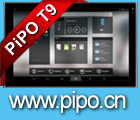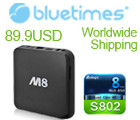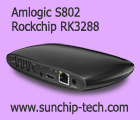Rockchip RK3399 is Rockchip’s first big.LITTLE processor, 64bit ARMv8, on 28nm with two large ARM Cortex-A72 cores and 4 small ARM Cortex-A53 cores, with ARM Mali-T864 GPU, it features dual USB Type-C with DisplayPort audio-video output support, H265/VP9 10bit 60fps HDMI 2.0 decode, PCI-e, 8 channel microphone array and support for the latest Android, Linux, Chrome OS and Windows 10. The RK3399 SDK is available to Rockchip’s partners with sampling of the chip starting before the end of this month, full mass production in consumer electronics should happen in the 3 months of July to September 2016, depending on Rockchip’s mass production device partners reaching stable results with the chip. Rockchip may position RK3399 as a mass market well priced Hexacore 64bit platform.
Category: Chrome OS
Rockchip RK3399 big.LITTLE dual ARM Cortex-A72, quad ARM Cortex-A53, Mali-T864
Rockchip RK3288 is better than Intel Celeron N2840 for Chromebooks
This video compares the Haier Chromebook 11E on Rockchip RK3288 with the Samsung Chromebook 2 on Intel N2840. They are also being compared by Moor Insights and Strategy at https://www.slideshare.net/slideshow/embed_code/key/cor4EPWfvP97lt There are several other “latest” Intel Chromebooks from Dell, Toshiba, Lenovo, Asus, Acer, HP which all are running on N2840 Celeron, or N2830 Celeron, and thus for all these, Rockchip can claim to have better value, better performance and better battery life. Thus to be best suited for the worldwide education market.
Here are some of the numbers claimed in favor of the ARM Powered Chromebook in the case of RK3288 vs N2840:
80% better video performance
32% faster multi-tasking
37% faster app loading
265% faster 3D graphics
31% better power consumption for online video, Google Docs and Gmail
I have already been testing the Haier 11E as my main laptop over the last 6 months, and I can tell you that it performs absolutely great. There were some WiFi disconnect issues but I think those have been solved by Google’s automatic software updates to the Chromebook. I will post a new video with my Haier 11E Chromebook soon so check back for that.
Moor Insights and Strategy has conducted a detailed analysis comparing Rockchip RK3288 with Intel N2840 Chromebooks which is available as a slideshow here: https://www.slideshare.net/slideshow/embed_code/key/cor4EPWfvP97lt
€349 Toshiba Chromebook Satellite CB30-B on 64bit Intel Celeron N2840 with 4GB RAM and 16GB Flash
Toshiba Chromebook Satellite CB30-B surely runs Google Chrome OS, based on 64-bit Dual Core Intel Celeron N2840 Processor, with 13.3’’ Full HD IPS TFT display, 4GB RAM, 16GB SSD, comes with 1*USB 3.0 host, 1*USB 2.0 host,HDMI port, SD card reader, with a nice slim design, retail price at 349euro at amazon now.
Microsoft Playready DRM integrated with OPTEE, Linaro Digital Home Group
The Linaro Digital Home Group (LHG) has achieved a milestone in the delivery of an open source reference solution for the consumption of premium content on ARM powered devices.
The media solution ulitizes several open source components coupled with a commercial DRM that executes in a Trusted Execution Environment (TEE). The TEE used is the Open Portable TEE (OPTEE) from Linaro, running on ARM TrustZone.
The solution integrates the following key components:
– W3C EME Working Draft (31 March 2015)
– Microsoft PlayReady DRM Porting Kit v3.0
– OP-TEE
– OpenCDM/OpenCDMi
– Chromium v43
The solution is powered by a STMicroelectronics STiH410 ARM Cortex-A9 processor.
ACER Chromebook R11 Flip Convertible
ACER Chromebook R11 is 360 degree Foldable notebook with 11.6’’inch Touch screen, comes with very nice slim and nice design, based on Quad Core Intel Celeron N3150 @1.6GHz, 4GB RAM, 32GB storage, retailer price at $299 coming soon in middle October.
$149 Haier Chromebook 11 on RK3288, ready for OEM brands worldwide
Haier presents their Haier Chromebook 11 on Rockchip RK3288 selling at $149 now at http://amzn.to/1yrxBY2 they are also the only manufacturer who can provide this as the OEM Chromebook for any brand who wants to make a big order. Before the end of this year, Haier will also make a 13.3″ Chromebook. This is the product that I have been waiting for for 10 years since OLPC was launched. This is potentially the $100 Laptop for Education realized. It’s $149 now in retail, but it could be $100 maybe if subsidized when providing for the children in developing areas of the world. Google needs to invest in a lower power sunlight readable LCD display, HTML5 offline apps and content needs to work better, the Android apps integration in Chrome OS needs to be fully supported. If Haier, Google, Rockchip, Governments and others do this right, they can sell 100 million of these.
You can contact the Haier OEM brand representative if you are a member below:
[s2If !is_user_logged_in()]
| Logged-in Members of ARMdevices.net ($50/year) can see the full contact information for this company from the business card here. Become a Member Now! |
[s2If is_user_logged_in()]Haier Chromebook OEM contact:
Jason Wong
General Manager, B2B of Haier Computer Overseas Department
jasonwong@ithaier.com
oem101@163.com
+86 53288937841
No.1 Haier Road
Qingdao 266101
China[/s2If]
Acer Chromebook 13 with touchscreen on Nvidia Tegra K1
Acer BYOC is a cross-platform, multi-device, multi-network cloud system to create, personalize IoT devices to help make IoT devices be successful, where the IoT cloud apps are run on edge devices, to gateways to the cloud.
$249 ASUS Chromebook Flip on Rockchip RK3288C convertible 10.1″ touch screen, 2/4GB RAM,
Asus Chromebook Flip is the world’s first 360 degree convertible Chromebook, light and nicely designed, powered by Rockchip RK3288 quad core ARM Cortex-A17, with 2GB or 4G RAM, 10.1″ and 10 finger multi-touch screen, dual band WiFi 802.11&BT4.0, full size QWERTY keyboard, and large touchpad, up to 9 hours battery life, Ultra ligh at 0.89KG, to be available from Q3 2015 worldwide.
$169 ASUS Chromebook C201 on Rockchip RK3288, 2G/4G RAM, 11.6’’ display, shipping now
The Asus Chromebook C201 is an ultra light well built ARM Powered Chromebook, powered by the Rockchip quad-core RK3288 Processor, with 2GB RAM or 4GB RAM as option, 11.6″ display, dual-band WiFi 802.11, BT4.0, full size QWERTY keyboard, and large touchpad, up to 13hours of battery life, Ultra light at 0.98KG, super thin at 17.9mm. It is shipping from now for $169 at http://amazon.com.
Marvell Avastar 88W8997 Wi-Fi 11ac wave2 in 28nm for best Wi-Fi performance and Bluetooth 5.0
Marvell launches their new 88W8997 chipset for the highest performance Wi-Fi chipset for Chromebooks, Laptops, Tablets, Chromecasts, TVs and more. The 88W997 is built on 28nm enables 40% lower power consumption for the Wi-Fi at a higher performance. Marvell are first to get qualified for Chromebooks, in front of Broadcom, Intel and Qualcomm. The 2×2 Wi-Fi system doubles the range. Marvell integrates also the Bluetooth 5.0 spec implementing double the bandwidth for Bluetooth, LTE anti-interference. Marvell provides CSP Chip on Board, QFN package Chip on Board and the M2 2230 module PCI-E Form factor.
Chromebook on ARM Cortex-A72 MediaTek MT8173 big.LITTLE
MediaTek are showing their first Chromebook, with a dual ARM Cortex-A72 with dual ARM Cortex-A53 big.LITTLE of their “world’s fastest” MT8173 SoC with SGX6250 GPU. MediaTek are optimizing the Chrome OS performance in partnership with Google to get this launched as soon as possible, though probably not before the beginning of next year they say. It has dual USB Type-C, one of which can output to a secondary display. For the final product, the built-in Chromebook display can be up to 2K resolution, now showing off 1366×768 on this prototype. Fast charge through the USB Type-C will work. The displays could be 11.6″ or 13″, the displays will probably be 1366×768 or 1920×1080. The target is affordable pricing. MediaTek together with Imagination and Google are the first to optimize the PowerVR6 GPU for Chrome OS, trying to take advantage of all its heterogeneous multiprocessing speecs to try to optimize the performance. MediaTek is revisiting their optimization approach to upstream all of their work, soon enough people will be able to get all of the source code that they are developing to get this ready.
$149 Haier Chromebook 11
Haier is launching their ARM Powered Haier Chromebook 11 to be shipping any day now at http://amzn.to/1yrxBY2 for shipping all over the USA with availability probably in all Chrome OS countries also imminently. The Haier RK3288 Chromebook 11 has a nice matte type of display, which may make it preferable for me over the Hisense and Asus one. But if matte or not is to be exclusive to this model or not, is to be confirmed. Again I would prefer a 13.3″ matte RK3288 Chromebook with 4GB RAM and with at least 13 hours of battery life. To challenge my $199 Acer Chromebook 13!
$169 Asus C201 ARM Powered Chromebook with RK3288
Asus C201 is their new Rockchip RK3288 based ARM Chromebook to be sold at $169. With a nice keyboard and mousepad. The Asus Rockchip Chromebook is to be available imminently.
$149 Hisense RK3288 Chromebook Hands-on Multi-Tab Web Browsing Test
Here’s some Web browsing and keyboard typing speed/accuracy test, I load a few random websites on the press room wifi featuring some smooth two-finger scrolling and clicking (consider trade show’s thousands of people creating a bit of interference affecting the speed maybe a bit). The Hisense RK3288 Chromebook is one of the world’s best value laptops at $149 I think, with I think the best mousepad among the $149 RK3288 Chromebooks (requires least/best pressure to click it seems) and the exterior design of the Hisense with some kind of granular texture I think is the nicest to handle and hold. But the Haier has a preferable matte display compared to the glossy display that I have seen on all the other RK3288 Chromebooks. While the idea of 4GB RAM may sound appealing, even if that increases the price by something like $20 (if they make such 4GB options available), maybe one can also consider that RAM usage on this RK3288 Chromebook, and RAM usage on Chrome OS in general, may be something that Google and Rockchip have been tweaking and optimizing alot, and it’s something that is always improving with the automatic and regular software updates that we can expect to be sent out by Google to these. Please understand that I do not believe in running certain browser benchmarks to measure the usability/speed and performance of real user web browsing. To do an optimal benchmark, someone with high-speed cameras should measure how long it takes certain novice and advanced users to do a whole range of things on the web. To me the performance seems extremely good and satisfactory. But of course I would like to have one of these and to be able to use them as my main laptop, to see if it feels like the 32bit RK3288 ARM Cortex-A17 quad-core can power all my web browsing needs! Imagine a smooth enough performance already achieve, how extra smooth the performance may be when Rockchip releases perhaps a next generation Chromebook optimized 64bit processor! Using the newly announced ARM Cortex-A72 perhaps! Check back also for my tests of the RK3288 Chromebooks by Asus and Haier.
Rockchip RK3288 Chromebooks $149 Hisense, Haier and $169 Asus
Rockchip shows their super cool new $149 Chrome OS Chromebooks on their RK3288 quad-core ARM Cortex-A17 with ARM Mali-T764 GPU. The performance seems very smooth (see my other separate Hands-on Multi-Tab Web Browsing Test videos with each of the Chromebooks). Rockchip has been working for more than the past year with Google’s Chrome OS team to optimize and deliver an experience for Chrome OS on their RK3288 platform, stable enough for now launching massive mass productions with Hisense, Haier and Asus through big Laptop factories in Taiwan and China. They would like to see big volumes shipped, possibly more than 10 million units shipped, now available for pre-order the Haier RK3288 Chromebook for $149 at Amazon and the Hisense RK3288 Chromebook for $149 at Walmart
kernelci.org upstream kernel validation project
Tyler Baker discusses and demos http://kernelci.org, where development boards all over the world are being booted with the bleeding edge upstream kernel to provide validation results to the kernel community.
96Boards Linaro Development Boards Initiative, $129 HiKey with Hisilicon 64bit Kirin620
With the first being the Hislicon Kirin620 Octa Core ARM Cortex-A53 based $129 HiKey development board, http://96Boards.org is a new open hardware specification for ARM 32bit and 64bit development boards, and a Community Program for software delivery to developers, makers and OEMs. In this video, Linaro CEO George Grey describes the standardized expansion buses for peripheral I/O, display and cameras allowing the hardware ecosystem to develop a range of compatible add-on products that will work on any 96Boards product over the lifetime of the platform.The 96Boards initiative is designed to offer a single software and hardware community across multiple vendor boards supporting a range of different features. A fixed set of minimum functions including USB, SD, HDMI and standardized low speed and high speed peripheral connectors are provided. Vendors may add customized hardware and feature sets provided the minimum functions are available. Linaro expects this to extend the platform life, increase the market for add-on hardware, and accelerate open source upstreaming of support for new SoC features.
Here is the session by Linaro CEO George Grey talking further about the 96Boards hardware at Linaro Connect Hong Kong 2015:
Hisilicon 3716CV200 runs RDK with Chromium Blink Framework
Linaro with members such as Hisilicon are porting and optimizing Chromium Blink with gstreamer running just above EGL, the next steps are to merging fully with the RDK project to replace the webkit core with blink core.
Chromium Blink Embedded Framework on STM B2102 and Hisilicon Poplar
The Linaro team ported the Chromium Embedded Framework to Linux running on ARM, the framework utilizes an EGL backend integrated using Chromium’s Ozone abstraction layer.
Enplug Digital Signage Software
Enplug, winner of CES’s ShowStoppers Startup Competition, is the developer of the first public computing platform. Enplug’s software turns any display into a public computer, enabling businesses to seamlessly engage with their audience. Businesses with displays of all sizes use Enplug to show interactive and live social media feeds, news, games, and many other apps developed by third-parties. Enplug wants to partner with display and set-top box makers to have its software pre-loaded for free and revenue-share with the hardware maker. It is looking for other display and set-top box makers to work with you can contact them here by phone: +1-855-536-7584 or email: Hello@enplug.com





